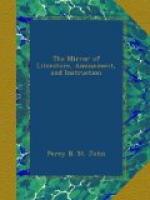What more shall be said of the mansion, or of the domain, full seventy statute acres, which surrounds it?—of the herds and flocks content to thrive in silence on the richness of its fields, and thrive they do in wondrous measure of prosperity? Nothing.—Nor much of that more gamesome troop of idle steeds, though pleasant to their master’s eve, who, on its green expanse, frisk and gambol out a sportive colthood, or graze and hobble through a tranquil old age, with the active and laborious honours of a public life past, but not forgotten. Little shall be said of that smooth and narrow pool, scarce visible among the rising shrubs which belt in and shroud the grounds from the incurious wayfarer; or of such carp and tench as, having escaped the treacherous toils of the nightly plunderer, gasp and tumble on its surface, delighting to display their golden pride in the mid-day sun, before the gaze of lawful possession. Nor shall the casual reader be led carelessly and wearily to note the many sweet memorials of private friendship, records of the living and the dead, which, standing forth from amid the lightsome glades and leafy shadows around, make the place sacred to many a strong affection. Romantic the scenery without is not, and for spacious halls and gorgeous canopies the eye may search in vain within. But for the warm cheer of the little oak library,—for the quaint carvings, the tracery of other times, which abound therein,—for the awful note of the blood-hound, baying upon his midnight chain,—and the pleasing melancholy of the hooting owl from his hereditary chamber in the roof,—and for the tunefulness of the cooing wood-quests, and the morning rooks which bustle and caw, and of the high winds that pipe and roar, daily and nightly, through the boughs,—and for the deep glossy verdure of the pastures stretching forth to the brave distant hills which fence the vale,—to those, who in such things take delight, Lilies hath still its charms.
From the fireside of the afore-mentioned little oak library the following legends proceed.
[Few of the pieces fall under the denomination of “Legends,” if we except “the Feast of alle Deuiles, an ancient ballad;” “the Costly Dague;” “the Ladye’s Counselloure;” and “the Dole of Tichborne;” which are in the quaint olden style. Throughout the other papers there is a pleasant spice of dry humour and knowledge of character, intermixed with a few touches of pathos, and a nice perception of the finest affections: now, with these various characteristics, the legends must prove attractive and amusing. We have only space to quote briefly from one of the most desultory of the papers—an ingenious one, on “Solecisms in Language.”]
“Is it your pleasure,” now and then asks a dentist, “is it your pleasure to have your tooth out to-day?”
“I do not care a pin,” is a very ordinary figure of speech, but of doubtful propriety; for one’s indifference, it appears to me, must very much depend on the position of the pin. In the cushion of one’s chair, for instance, it is absolutely disagreeable, and what one should care very much about.




